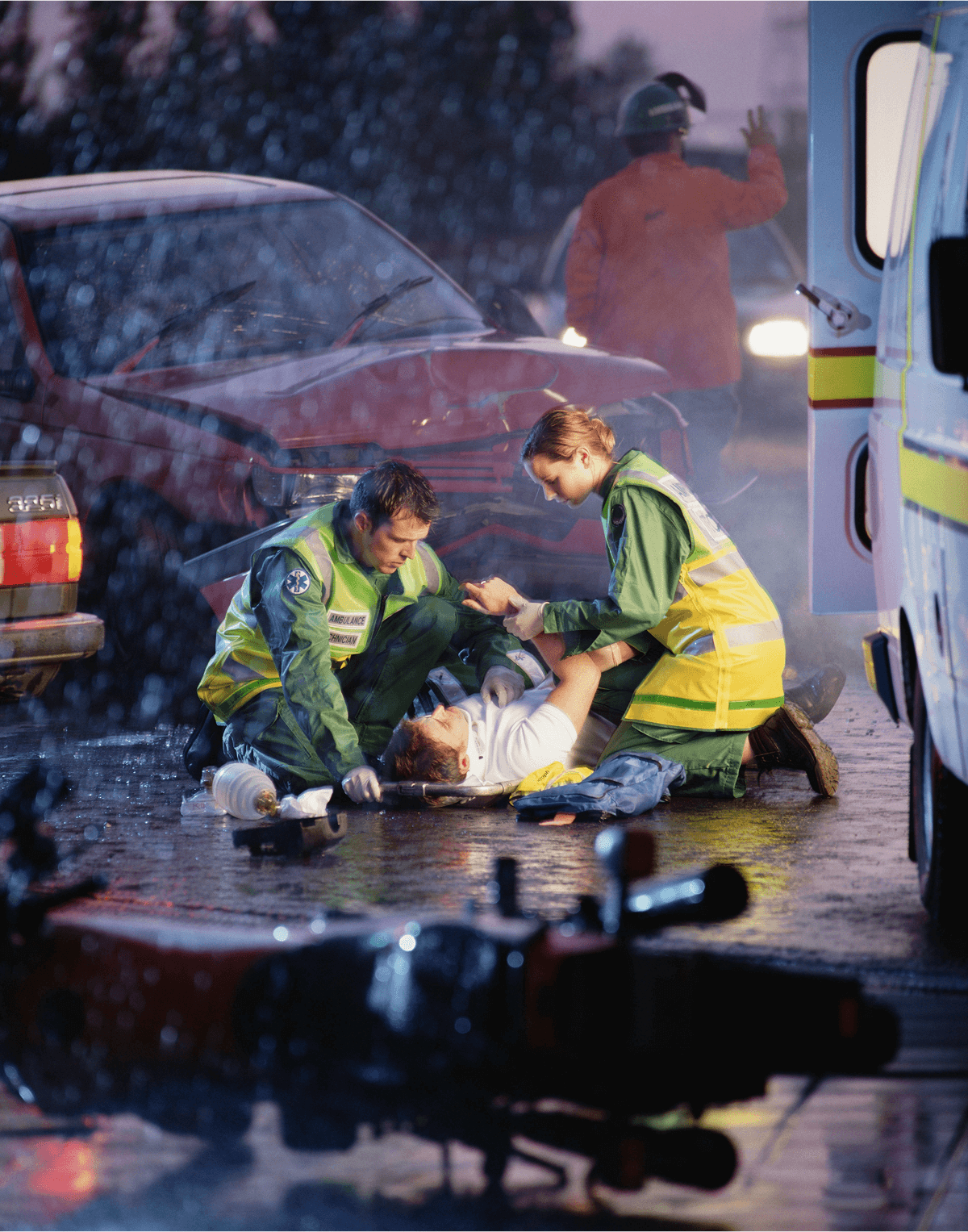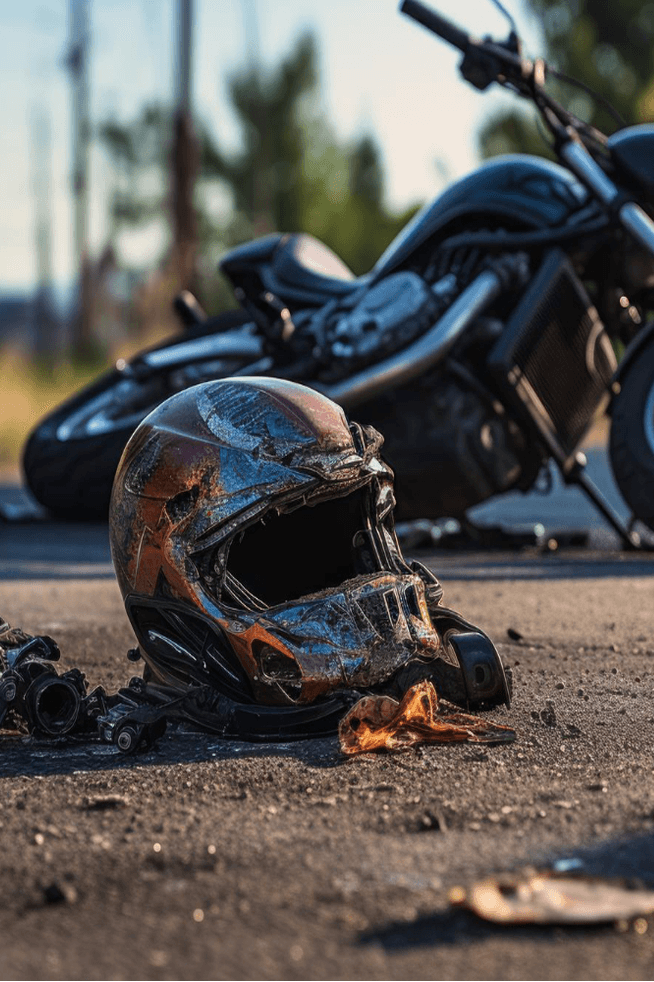
Miami Motorcycle Accident Lawyer Helping Clients Recover From Life-Changing Collisions
While any crash has the potential to cause significant injuries, motorcycle riders face unique risks due to the open nature of their vehicles. Helmets and thick riding gear can provide some protection, but an accident with a much larger vehicle like a car or a truck can still be catastrophic. If you have been injured in a collision, a motorcycle accident attorney can deal with the insurance company and help you get the compensation you deserve for your injuries, so you can focus on healing and getting back onto the road.
We know finances can be complicated after a crash, so our law firm provides a free consultation for motorcycle accident cases. This way, you can explore your legal options with a compassionate Miami personal injury lawyer without any risk. If you choose to have Galimidi Law represent you in your personal injury case, you will only owe if we secure a settlement for you. Call today to schedule your free consultation.

What Steps Should You Take After a Motorcycle Accident?
Motorcycle accidents happen swiftly and can leave you in uncertainty. Remember that your safety and well-being are always the priority after a crash. Your first step should always be moving out of traffic, if possible, to prevent further impacts from other vehicles. If you or others involved in the crash are seriously injured, call 911 and follow the instructions of the emergency personnel who report to the scene. If you are physically able to do any further actions after the motorcycle accident, these are the steps you can take that may assist you with a future personal injury claim:
- Contact the police: Call the local police if they have not been contacted. The police accident report is a critical document for future claims because it gives a third-party view of how the accident happened, who was involved, and who the police believe was at fault.
- Exchange information: Get the full name, address, and phone number of the drivers of any vehicles involved. Record their insurance policy number along with the insurance company’s name and phone number.
- Talk to witnesses: If there are witnesses, encourage them to stay until the police arrive to give a statement of what they saw. Attempt to get their name, phone number, and address, if possible.
- Take photos: Multiple photos from different angles of the accident scene and the vehicles involved can be helpful evidence. Just be certain to avoid impeding the flow of traffic or putting yourself in a dangerous situation.
- Write down your recollections: While a crash can be very disorienting and it may be hard to get much evidence, especially if you have been injured, try to at least make mental notes of the circumstances of the accident. Write these thoughts down as soon as you can while they are still fresh in your mind. Include details about when, where, and how the motorcycle crash happened.
- Contact your insurance company: Provide them with any information available about the crash. This allows the circumstances of the motorcycle accident to be officially documented for later review. However, do not sign any forms, make recorded statements, or agree to any settlements without consulting with an attorney first to avoid damaging your potential for full compensation for damages.
- Do not discuss fault: Do not apologize or admit fault in the accident because these statements could be used against you later.
- Contact an experienced motorcycle accident lawyer: Consulting with a lawyer soon after the accident is critical. They can advise you on further actions you may need to take and will begin dealing with the insurance companies on your behalf.


What Are the Top Causes of Motorcycle Accidents?
While both motorcyclists and the drivers of other vehicles may be at fault for motorcycle accidents, the individuals on the motorcycle often face the most severe consequences of a crash. In fact, motorcyclists are, on average, over 27 times more likely to be killed in a collision than passengers in a car. Every crash has different circumstances, but these are some of the most common ways motorcycle accidents occur:
- Intoxicated driving: It is estimated that over a quarter of all fatal accidents involving motorcycles have alcohol use as a factor. Driving under the influence dramatically increases the risks of all types of vehicle crashes, and those convicted of DUIs or DWIs can face both criminal and civil repercussions.
- Speeding: Driving above the posted speed limit dangerously decreases the ability of drivers to stop in time to avoid an accident and increases their chances of losing control of their vehicle.
- Left-turn crashes: If a driver fails to notice an oncoming motorcyclist when they are making a left turn, it can result in an accident. According to the National Highway Traffic Safety Administration (NHTSA), left-turn accidents account for 36% of all motorcycle accident fatalities.
- Reckless lane changes: According to the Hurt Report, a safety study done on motorcycle accidents in the U.S., in two-thirds of motorcycle accidents involving multiple vehicles, a car or truck driver caused the accident by violating the motorcycle’s right-of-way. Often this happens when drivers merge lanes or pass without adequately checking for motorcycles.
- Lane splitting: This dangerous maneuver involves a motorcyclist driving between lanes of traffic and is illegal in Florida.
- Inattentive driving: Drivers who are texting, eating, or otherwise not paying attention to the road pose a danger to everyone. This is a significant factor in all vehicle accidents, not just motorcycle accidents. However, motorcyclists are at greater risk of going unnoticed by distracted drivers and suffering serious injuries from a crash as a result.
- Hazardous road conditions: Bad weather, loose gravel or grass cuttings on the pavement, damaged roads, potholes, and more can increase the risk of a motorcycle crash.
What Injuries Do Motorcycle Accident Victims Suffer?
Motorcycles lack many safety features of other vehicles and leave their riders exposed to the elements. While motorcyclists enjoy the feeling of freedom this provides them, it comes with a downside. Without the protections afforded by modern safety equipment, injuries sustained by a motorcycle driver are much more likely to be severe and life-threatening. The serious injuries sustained from a motorcycle crash can lead to permanent disabilities, chronic pain, disfiguring scars, and the inability to work. In the worst cases, motorcycle accident injuries may prove fatal. Significant injuries that can occur during a motorcycle accident include:
- Broken bones
- Facial and eye injuries
- Internal injuries, including internal bleeding or collapsed lungs
- Head injuries, including TBIs
- Crushed or severed limbs
- Road rash (lacerations, often on the extremities, caused by sliding across the pavement at high speed)
- Spinal cord injuries, potentially causing complete or partial paralysis
- Whiplash
- Wrongful death
Head injuries are some of the most devastating injuries to result from motorcycle accidents. Unfortunately, even a mild head injury may involve lengthy, expensive medical treatment and rehabilitation. Long-term effects of a head injury may include seizures, difficulty speaking, memory issues, personality changes, chronic headaches, depression, and vision changes. If a driver is thrown from their bike during a crash, the resulting impact may cause skull fractures, penetrating brain injuries, and other severe head trauma, damaging the brain tissue and possibly leading to death. If anyone involved in a motorcycle accident exhibits symptoms of a serious head injury, including nausea, vomiting, dilated pupils, headaches, unconsciousness, convulsions, slurred speech, or loss of coordination, they need immediate emergency medical attention.


How Long Do You Have to File a Motorcycle Accident Claim?
A statute of limitations is the amount of time a victim has to file a claim to recover compensation, and each state has its own laws governing these limits. If you do not begin litigation during this time, you will no longer have the opportunity to take your claim to court. For personal injury claims in Florida, including motorcycle accidents, the statute of limitations is generally 2 years from the date of the accident. Two years may seem like a long time on paper, but when a crash victim faces a long and challenging recovery, other concerns may rapidly eat up that time. It is critical to contact a personal injury law firm with knowledgeable motorcycle accident attorneys as soon as you can after your crash because evidence may deteriorate over time, and it can be harder to build a case after several years.
If your loved one has tragically passed as the result of a motorcycle accident and you are looking to file a wrongful death lawsuit against the at-fault party, the statute of limitations in Florida is set at two years from the date of the accident. Some exceptions to the statute of limitations may “toll” the clock and increase the amount of time you have to bring a motorcycle accident case, but they are relatively rare. An experienced motorcycle accident attorney can evaluate your case and explain if any of these situations apply.
What Damages Can Be Recovered After a Motorcycle Accident?
Although a motorcycle accident can happen in a flash, the effects on victims can be long-lasting. They often face dauntingly large medical bills without the ability to pay them because of the difficulty of working after their motorcycle accident injuries. Some may never be able to return to the job they love and may find even day-to-day tasks challenging. The insurance company often attempts to only pay a portion of what a victim needs to cover their expenses. A skilled motorcycle accident lawyer can help you get the justice you need and the maximum compensation you deserve for your motorcycle accident so you can put the stress of bills behind you and focus on your future. While compensation can vary based on the details of your accident, some types of economic and non-economic damages that you may be eligible for include:
- Lost wages: If the accident caused you to miss work or change your ability to make a living, you could be compensated for your lost income. If you have become permanently disabled, you may receive compensation for the loss of your earning capacity.
- Medical expenses: Any expenses you incurred while treating your injuries from the motorcycle accident, including costs for surgeries, hospital, and ER stays, rehabilitation, durable medical supplies, follow-up visits, and other medical care, should be reimbursed. Future medical expenses could also be included if your injuries require ongoing care.
- Pain and Suffering: Accidents cause more than financial losses. You may be awarded damages for the distress and discomfort you have endured.
- Mental Anguish: You can seek compensation for the grief, shame, anxiety, depression, or other mental distress caused by your accident.
- Punitive damages: If the driver of the car or truck in the accident is found to have acted in a willfully negligent or egregiously reckless manner, the court may assess punitive damages. These damages both punish the offender for their actions and dissuade other drivers from acting similarly.
- Wrongful death: If your loved one was killed in a motorcycle accident, you could seek compensation for the loss of their support and companionship.


How Can Motorcyclists Protect Themselves From Crashes?
Most motorcycle riders are aware of the dangers of riding their bikes and take the necessary precautions to stay as safe as possible on the road. Wearing high-visibility clothing and keeping motorcycle lights on during the daytime can make car drivers more aware of motorcyclists and stave off some accidents. However, many factors in crashes are beyond the control of riders. Still, there are some steps the National Highway Transportation Safety Administration (NHTSA) recommends motorcyclists take to attempt to prevent dangerous crashes:
- Get appropriate training: Inexperienced riders are more likely to crash, so proper training is essential before going onto highways or riding in bad weather where the risks are higher.
- Perform a safety check before riding: Ensure your bike and all your equipment are working correctly before leaving. Get regular maintenance on your bike to catch any issues before they cause a crash.
- Wear a DOT-approved helmet: Helmets save the lives of thousands of riders every year.
- Follow all road rules: The rules are made to keep travelers safe. Violating posted rules such as speed limits dramatically increases your chances of having an accident.
- Do not ride while intoxicated: Drugs and alcohol slow your reaction times. If you cannot rapidly and safely react to your surroundings, your risk of a severe crash is much higher.
How Can a Motorcycle Accident Attorney Help You?
The insurance company does not have a motorcycle rider’s best interests at heart. They want to settle quickly for the lowest possible amount, or they may even try to place all of the blame for the motorcycle crash onto the victim. Galimidi Law believes victims deserve fair and total compensation for their injuries.
You may be concerned about hiring a motorcycle accident lawyer if you’re still incurring medical bills and are uncertain of what the future may hold, but at Galimidi Law, I understand that healing is a process. As a motorcycle accident lawyer, I will ensure you have reached a stable point in your recovery before finalizing any settlement amount, so you can be confident that all of your medical expenses and future care can be properly calculated into your compensation. In the meantime, I will work diligently to build the most robust case possible using all available information and evidence. When necessary, medical professionals and accident reconstruction experts will be utilized to provide their opinions of how the crash occurred and how it has impacted and will continue to impact your life.
Contact an experienced motorcycle accident attorney today to schedule a free consultation.


